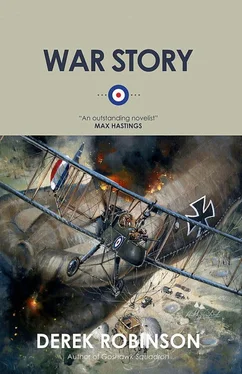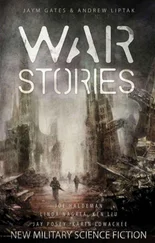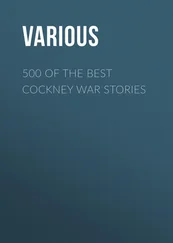O’Neill removed a bunch of coloured photographs from Paxton’s hand. “I wish to buggery you wouldn’t breathe on my naked ladies,” he grumbled. “And go and stink in your own pit.”
“It’s wonderful,” Paxton said. “Just listen. It’s superb. Isn’t it superb?”
“Get your bonnet on,” O’Neill said. “Let’s go and get some breakfast.”
They took off half an hour later, to cover a Quirk on a photographic patrol. All the squadron was in the air. Paxton was eager to see what the bombardment looked like but when they crossed the Front it was obscured by a drifting fog of smoke from the guns, and the enemy trenches were completely lost under a cloud of grey-brown dust, which occasionally gave birth to shapely puffballs when the heavy howitzers caused an unusual amount of damage. The barrage drowned out the FE’s engine. There was so much din that Paxton heard nothing. He thought he might have gone deaf, so he undid his flying helmet and peeled back a flap. His ears hurt. It was like being in the middle of a mob of angry blacksmiths He did up his helmet, fast. Behind the British Lines, gunflashes made a flickering stream of red and yellow that wandered to the north and faded into their own smoke. Paxton turned his head. Another stream wandered south, as bright as fireflies. Those guns have fired a thousand shells while I watched them , he thought. How magnificent! How stunning!
They rendezvoused with their Quirk and took care of it while it paraded up and down, infuriating the archie. If O’Neill held his course and height for thirty seconds the archie had a go at him, too. But this was not their day. The Quirk got its pictures and went home. O’Neill still had fuel. He climbed and searched further to the east.
There was nothing much to see: the odd speck, hopelessly remote and going away; the odd line of cloud, and not much of that. O’Neill decided to make a certain cloud his turning-point. It turned out to be big and sprawling, with a massive overhang that almost formed a cave. The shadow of the FE got there first by half a second and went flitting across the face of the cloud until he caught up with it and they charged into the near-cave and came out the other side as an Albatros came flying in. For an instant O’Neill’s stomach clenched as hard as stone because he knew their wings must hit. They flicked past each other. He slumped, forgot how to breathe, and recovered to find his arms and legs automatically stuffing the controls into a corner so as to drag the FE into a tight turn before the Albatros came back and cut it to pieces.
Paxton found it very entertaining. It was like sitting in the cinema, with unexpected pictures suddenly appearing and disappearing. The FE banked, and that was like sitting in a fairground ride, swinging in a circle that pressed you into your seat. Enormous fun. The tail of the Albatros crept into his vision. He screwed his head around. It was a dove-grey two-seater. The observer had the rear cockpit, and a cutaway in the top wing gave him a wide field of fire. Paxton saw him swing his gun, release a squirt of fire, and raise his head to check results. Missed by a mile.
That short stutter of bullets roused Paxton. He shoved himself forward and swung the Lewis to the side. Hopeless: with the FE in such a steep bank he was aiming at the ground. He sat on the cockpit floor and aimed as high as possible. Still too low. A ten-round burst went nowhere near the Albatros. He shouted at O’Neill and shook the Lewis. O’Neill saw, but he held the FE in this tail-chasing turn, the wings almost vertical. O’Neill had his own problems.
The Albatros carried a machine gun in its nose, synchronised to fire through the prop. At least he was pretty sure it did. The FE had a nose gun. First plane to get behind the other would score. So each pilot hauled his machine into the tightest of circles. With the planes banked on their wingtips, each observer was trying to fire above his head and it couldn’t be done. The gun fittings made it impossible. O’Neill could flatten his turn and give Paxton a shot, but only at the cost of slackening the circle and letting the Albatros catch him.
So round and round they went.
Paxton got back on his seat. He wondered if he could unfix the Lewis and fire it from his shoulder. Unlikely. He took out his Service revolver and blazed away at the enemy, hanging perpetually opposite him. He might have been firing blanks for all the difference it made.
O’Neill worried about fuel. He worried about it so much that he failed to notice a stubby little German biplane arrive overhead. It flew up and down, apparently intrigued by the scene below. Paxton saw it, and pointed. There was nothing O’Neill could do except curse, so he cursed. After a while he lost sight of it. There was nothing he could do about that, either.
The stubby Hun had vanished because he had decided to interfere. Perhaps he thought the Albatros needed rescuing. More likely he thought the FE was easy meat. His plan of attack was simple. He would approach, straight and level, until the FE, tipped on its side and presenting a large target, flew into his sights.
This happened and he opened fire and that was that. Half his bullets missed, two or three splashed against the case of the Beardmore, and several holed the nacelle or the canvas wings. These last bullets kept going, of course, and a cluster of them found the tailplane of the Albatros, whose pilot abruptly found his machine threshing about and trying to fly crabwise. The tail-chase was over. Paxton saw the Albatros wandering into his sights and he gave it a burst. O’Neill saw a collision dead ahead and kicked the FE until it reversed its turn and sheered off. The next time he saw the Albatros it was far below and diving hard. The stubby little Hun had disappeared. Very wise , O’Neill thought. Forget it ever happened. He flew home, carefully, counting the bullet-holes. He could see fifteen. The mechanics later found another twelve.
“Bloody lucky,” O’Neill said.
“Piss off, Bunny.” Paxton showed him the heel of his left flying boot, shot through and flapping loose. “Bloody Huns can’t shoot straight. “
O’Neill tried to undo a button but he couldn’t make his fingers work. “You don’t take it seriously, do you?” he said. “It’s all just a game, isn’t it?”
“As long as we win, Bunny.” Paxton wrinkled his nose and undid the button for him. “Who cares? Just listen to those guns!”
The opening barrage had lasted an hour and ten minutes. It subsided to a perpetual thunder. For weeks the London papers had been predicting a big new offensive. Well, everyone knew now where it would be. The mood at Pepriac was optimistic. The Hun was taking a tremendous battering, the sun was out and the Chinks had finished digging the swimming pool.
Most of the squadron strolled over to look. It was a very big hole, brimful of water from a diverted stream. “Bet you haven’t got anything like that back in Grand Rapids,” Mayo said to Stubbs.
“Awesome is the word for it,” Stubbs said. “Truly awesome.”
“No, I think wet is the word,” Ogilvy said. “Where’s Charlie? He was at Cambridge.”
Essex tossed in a small stone. “Liquid,” he said. There was a round of applause. “Or maybe fluid,” he added.
Mayo said: “I think Pax should declare it open. After all, it was his idea.”
“Who, me?” Paxton said.
“Brilliant.” Mayo pushed him in. Stubbs pushed Mayo in. After that everyone got pushed in until only Charlie Essex was left. They all got out and chased him and caught him and threw him in. He couldn’t swim, and it was a few moments before Spud Ogilvy remembered this, so they had to fish him out and hold him head-down to empty him. But it was an excellent pool and there was no need to wear trunks. Paxton felt the hot sun on his wet skin and looked about him at the leaping, splashing bodies. Comradeship , he thought. That’s what this war is all about.
Читать дальше












